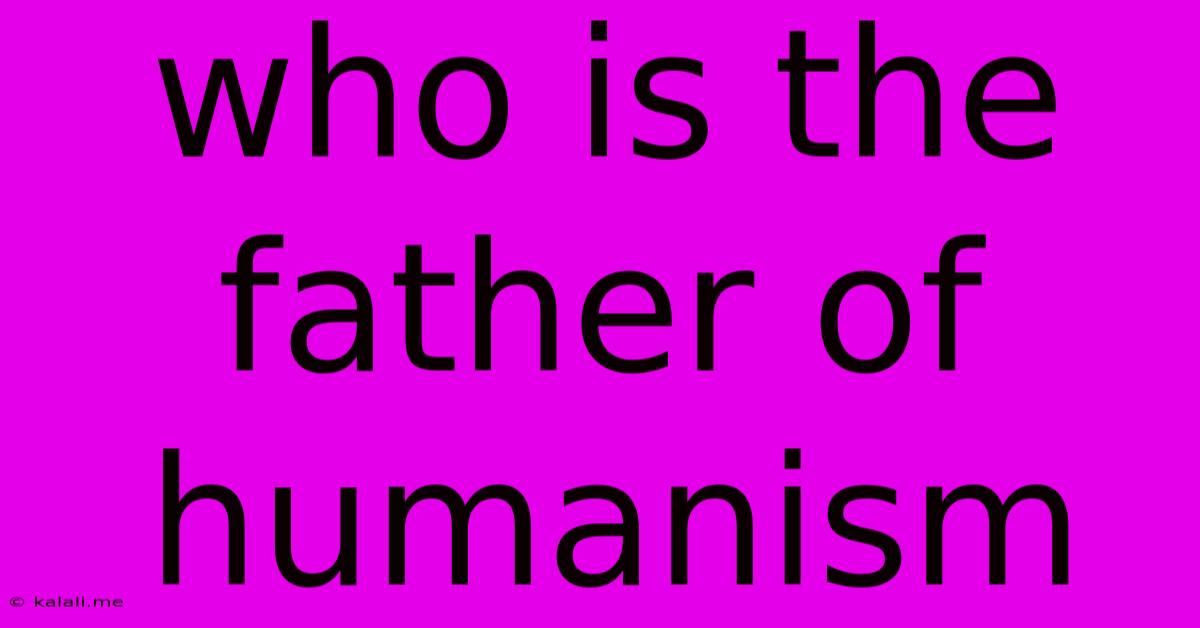Who Is The Father Of Humanism
Kalali
Jun 15, 2025 · 3 min read

Table of Contents
Who is the Father of Humanism? A Complex Question with No Single Answer
The question of who deserves the title "Father of Humanism" is a fascinating one, steeped in historical complexities and nuanced interpretations. There's no single, universally accepted answer. Instead, the title is more accurately applied to a constellation of thinkers whose ideas collectively paved the way for the humanist movement. This article will explore the key figures often associated with the origins of humanism and explain why pinning down a single "father" is ultimately an oversimplification.
The Seeds of Humanism: Ancient Greece and Rome
Before the formal humanist movement emerged in the Renaissance, seeds of humanist thought were sown in ancient Greece and Rome. Philosophers like Socrates, Plato, and Aristotle emphasized reason, ethics, and human potential, laying the groundwork for future humanist ideals. Their focus on human agency, virtue, and the importance of earthly life, rather than solely divine matters, resonated deeply with later humanist thinkers. Similarly, the emphasis on rhetoric, civic engagement, and human flourishing found in Roman thinkers like Cicero and Seneca provided further intellectual foundations for the humanist movement.
Renaissance Figures and the Rise of Humanism:
The Renaissance saw a revival of interest in classical learning, which played a crucial role in the rise of humanism. Several prominent figures are frequently cited in discussions surrounding the origins of humanism, each contributing unique perspectives:
-
Francesco Petrarch (1304-1374): Often considered a "father" of Renaissance humanism, Petrarch championed the study of classical texts, believing they held the key to understanding human nature and achieving a virtuous life. His rediscovery and promotion of classical literature significantly influenced the intellectual climate of the time. He emphasized the importance of studia humanitatis, the study of humanity, which included grammar, rhetoric, history, poetry, and moral philosophy.
-
Giovanni Boccaccio (1313-1375): A contemporary of Petrarch, Boccaccio also played a vital role in the humanist movement, notably through his work Decameron, which showcased human experience and emotions with realism and wit. His scholarship and promotion of classical literature further contributed to the intellectual ferment of the Renaissance.
-
Leonardo Bruni (1370-1444): Bruni was a key figure in developing humanist historical writing and emphasized the study of civic virtue in classical texts. He articulated the humanist program quite clearly and contributed to the development of humanist historiography.
-
Marsilio Ficino (1433-1499): While incorporating Neoplatonism, Ficino emphasized the dignity and potential of human beings, aligning with key humanist principles. His translations and commentaries on Plato's works greatly influenced humanist thought.
Why a Single "Father" is Inappropriate:
Attributing the title "Father of Humanism" to a single individual ignores the collaborative and evolving nature of the movement. Humanism emerged from a complex interplay of intellectual currents, drawing inspiration from diverse sources and developing gradually over time. Petrarch, for instance, while highly influential, built upon the work of earlier thinkers, and later humanists expanded upon his ideas. The movement encompassed a rich diversity of thought and approaches, making it impossible to credit any single person with its inception.
Conclusion:
Instead of seeking a singular "father" of humanism, it's more fruitful to recognize the collective contributions of numerous thinkers across centuries. From the classical philosophers who laid the conceptual groundwork to the Renaissance figures who revived and redefined classical ideals, each played a crucial role in shaping the humanist movement. Understanding humanism requires appreciating its rich and multifaceted history, acknowledging the collaborative efforts of countless individuals who contributed to its enduring legacy.
Latest Posts
Latest Posts
-
Angular Distance North Or South Of The Equator
Jun 16, 2025
-
What Is The Least Common Multiple Of 15 And 40
Jun 16, 2025
-
Can Camels Run Faster Than Horses
Jun 16, 2025
-
How To Calculate The Partition Coefficient
Jun 16, 2025
-
An Elements Atomic Number Is Equal To Its Number Of
Jun 16, 2025
Related Post
Thank you for visiting our website which covers about Who Is The Father Of Humanism . We hope the information provided has been useful to you. Feel free to contact us if you have any questions or need further assistance. See you next time and don't miss to bookmark.